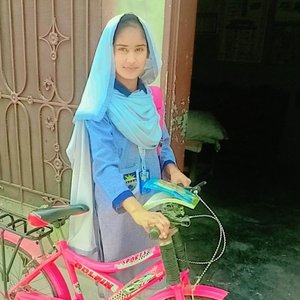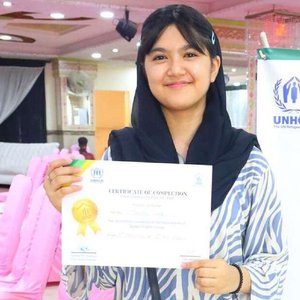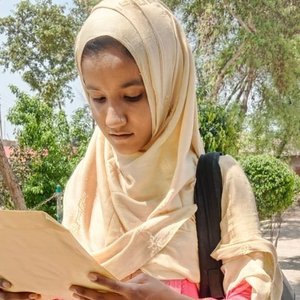During COVID-19 school closures, Indigenous girls increase access to books in rural Guatemala
(Courtesy of MAIA Impact School)
Elvira, Florinda and Yessica share how they’re creating libraries in their communities to help other Indigenous students continue to learn during the pandemic.
In public schools in Indigenous communities in rural areas of Guatemala, academic resources are scarce. The first schools we attended didn’t have enough books for lessons or to allow students to read for pleasure. During the pandemic, educational resources are even harder to come by. Some students receive homework from time to time, but many have gone months without any support from their schools. Children spend their time working or playing, leaving education in a forgotten corner.
Four years ago, we started attending MAIA Impact School, a local secondary school that provides Indigenous girls like us with quality education. Since we began attending MAIA, we’ve learned to trust ourselves and express our ideas. MAIA focuses on preparing us to be leaders at university and in the future so there are always opportunities for us to take initiative and speak out about the issues we care about. In July 2020, our school director, Vilma Saloj, invited us to participate in a community libraries project to help other Indigenous students access books while schools are closed during the pandemic. We immediately said yes. We wanted other children to have the opportunity to read, explore their imagination, and learn through the books.
Our first step was to organize book donations that a partner organization gave to MAIA. Then we sorted the books by reading level (beginner, intermediate, and advanced) and made a list of the books that were going to each community. To build our libraries, we had to coordinate with and present the project to community leaders, a process that was not difficult because there was already a connection between the community and our school. Our families offered space outside of our houses to install the libraries, this way the libraries are built inside our property but are still accessible to our neighbors since our houses are centrally located in our communities. There are three community libraries in Xolbé, Chuimanzana, and Chuarixche.
(Courtesy of MAIA Impact School)
We were so excited to share our libraries with our communities because we knew that access to books would expand the worlds of many children. We imagined the laughter of children and their faces full of joy as they read these new books. Before the libraries opened, we visited some classmates who live in the same communities as us to inform them about this project so that we could continue to spread the word. They were very excited by the news since they did not know that the school was going to install libraries.
To celebrate the new libraries, we held opening ceremonies in our communities and invited the neighbors to attend. When everyone arrived at the libraries, our director introduced the project. Everyone was looking at her very carefully and some mothers were nodding their heads. The director explained how the project was going to work: The libraries have books of different levels of difficulty and are open to the public — anyone can borrow a book and return it when they finish so that other children can read it. She also explained that the libraries are equipped with antibacterial gel to ensure the safety of the community during the pandemic.
Witnessing children selecting books and the happiness on their faces brought us joy, energy and motivation. Knowing that now children in our communities can keep learning during pandemic is very rewarding. We know we have the unique opportunity to continue our studies virtually with MAIA and we are happy that other children can also access books while schools are closed. One of our favorite parts of the project is how the libraries look; the way the pieces are put together makes them look inviting. MAIA provided the wood for the libraries and parents helped build them along with MAIA’s team members. The libraries are small and have four wooden legs with a red roof. They kind of look like a big birdhouse, which makes people curious about them. They are elevated from the floor to protect the books from the rain.
(Courtesy of MAIA Impact School)
Although it may not seem like a big project, we know that reading helps children develop their imagination and explore new worlds. It also helps them improve their comprehension and fluency, enabling them to continue developing academically. In our communities, the libraries are very helpful because there is no possibility of going to a bookstore and buying a book. With the libraries installed, our neighbors are taking advantage of this opportunity by taking books home up to four days a week. People are happy because the library initiative is something unique. During the opening ceremonies, there were some negative comments in addition to the positive ones. The negative comments came from some adults who did not understand the value of facilitating access to books and said that children would only be reading stories. But those comments did not stop us. We made the libraries specifically for the development of children's reading and to ensure their right of access to educational resources. We knew we were doing the right thing. No other institution is focused on helping children in our communities develop reading habits. We are very grateful that many of our neighbors are taking advantage of this. This initiative might be small, but it can change childrens’ futures, giving them access to the unforgettable adventures of reading books.
As students and the future leaders of our country, we want to see a more equitable society, where everyone can access information from around the world. Increased access to information will allow for a better family, community and social coexistence. We would like to see a higher standard of education in public schools and teachers showing students how to take advantage of books and enjoy them, instead of treating reading like a boring task. For that to happen, the government has to show interest and invest in education in rural regions of Guatemala. Through reading, we have acquired a lot of knowledge, which helps us become more analytical and curious people. It is not just a hobby, but a source of emotions through which we can reflect on our reality. Reading is to the mind what exercise is to the body. Though the community libraries are small, the knowledge within them is immense.
 Read more
Read more














